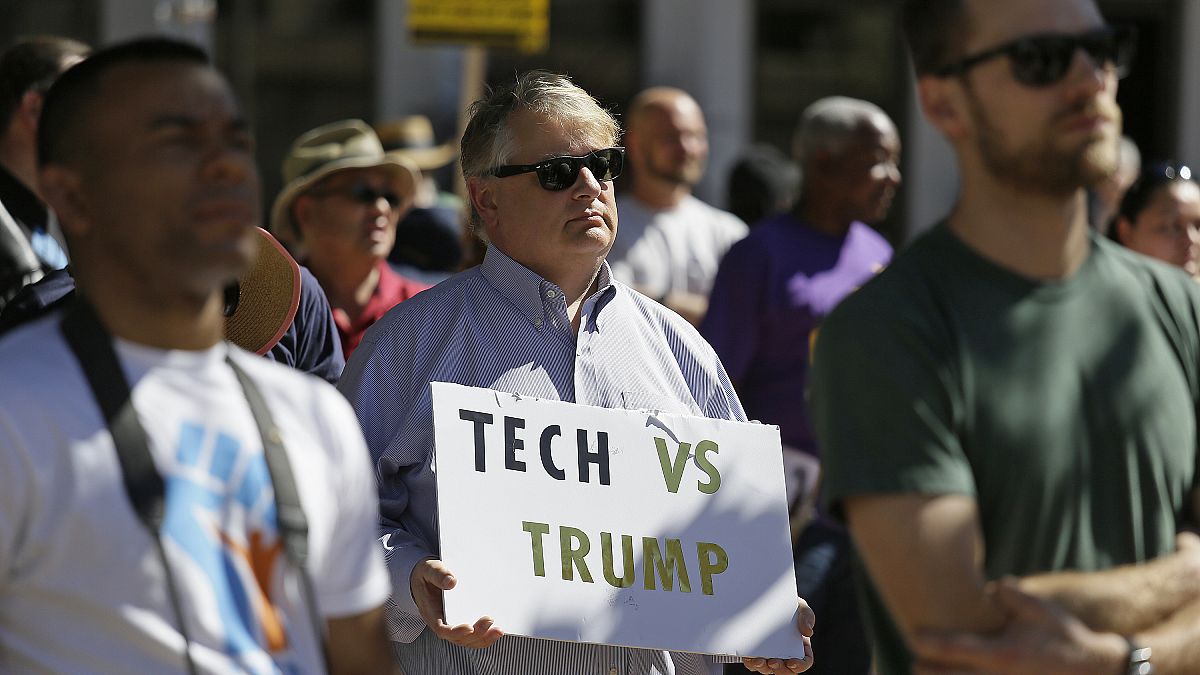How could a Trump win affect EU big tech enforcement? – analysis

A republican victory is likely to halt further progress on aligning EU and US policy.
Republican candidate and former US President Donald Trump is predicted to do well in the US election in November: polls predict Trump’s chances of winning now at 71%, which rose from earlier figures after the attack in Pennsylvania last weekend.
After four years of democrat president Joe Biden – and a lot of EU tech regulation coming out of the EU Commission targeting mostly US big tech firms – we look at what a victory for Trump could mean regarding Brussels’ Big Tech enforcement.
EU-California relationship
EU Commission tech envoy Gerard de Graaf – who moved to Silicon Valley in 2022 to ensure the EU executive’s presence in the global heart of innovation – told Euronews earlier this year that it made a difference for the EU to be on the ground in Northern California.
Big Tech CEOs knew how to find the Commission office in Silicon Valley, and preparations to comply with incoming European platform rules were discussed at the highest company level, arguably differing from when the General Data Protection Regulation (GDPR) entered into force in 2018, which took many US companies by surprise.
For example, when it came to the EU elections in June, the Commission issued guidelines to platforms to mitigate risks, but also actively liaised with top management in Silicon Valley.
J. Scott Marcus, associate senior research fellow at EU affairs think tank CEPS, told Euronews that it has been impossible to introduce new US-wide rules “because of intense political polarisation – the Congress has been deadlocked over nearly everything, and nothing gets through the US Senate without a supermajority.”
In the US, there are no federal privacy laws, but certain states, like California, have enacted legislation similar to the GDPR. “On artificial intelligence, where the EU just put in place an AI Act with many hard rules, the US has instead implemented an executive order that is mostly advisory in nature,” Marcus added.
Under Biden’s lead
When Democrat Joe Biden took office, he heavily recruited officials for the Department of Justice from the so-called New Brandeis political movement, who pushed Big Tech enforcement in a direction broadly in sync with EU enforcement, starting from an assumption that large monopolies – especially in the tech sector – may harm innovation.
The Biden administration also gave rise to the Trade and Technology Council (TTC), a forum in which the EU and US shared discussion on regulation such as on AI.
De Graaf said that discussions with the Biden administration were “very constructive”, and there was support for Europe’s plans on AI and the DSA. “The EU and US are the world’s biggest trade partners. The fact that they have channels to communicate is important,” he added.
EU Internal Market Commissioner Thierry Breton said in April that with the TTC, “we found the right channel to discuss and engage. We are the biggest and strongest allies on the planet.”
Although the TTC has failed to deliver any memorable landmark initiatives, it did help to halt escalating EU-US tariffs, and to rekindle relations that had become frosty during Trump’s first term. The likelihood of the TTC continuing in any meaningful guise if Trump retakes the White House appear slim to vanishing.
Musk vs the EU Commission
The recent spat between multimillionaire Elon Musk, the owner of social media platform X and a supporter of Trump, and the EU Commission, could come to be more common under a Trump administration.
Following interim conclusions in a commission probe into X’s compliance with the Digital Services Act (DSA) last week (12 July), Musk accused the EU executive of offering an illegal secret deal to avoid a fine. Soon after, Musk posted that he would take the Commission to court. The Commission denied these accusations.
Whether or not a Trump administration will take office later this year, companies operating in Europe still need to comply with the Bloc’s rules.
“On an issue like content moderation, for instance, the Democrats and Republicans both want change,” Marcus said. “The Democrats want the online platforms to do more moderation in order to reduce wilful misinformation, while the Republicans want the online platforms to do less moderation because moderation gets in the way of misinformation that they want to disseminate.”
A Trump election is likely to halt further progress on aligning EU and US policy: with trade tensions expected to grow. Much will also depend on the strength of a Trump victory, according to Marcus, and whether the Republicans manage to win both houses of Congress in addition to the White House.
“In his first term, Trump had little interest, and little patience with the hard work of getting laws enacted, but there is no guarantee that this would be the case in a second term,” he added.
Related
EU denies picking on US tech giants, says US also…
BRUSSELS (Reuters) - Europe's new tech rule aims to keep digital markets
€450M to drive green data infrastructure, the next startup hub,…
This week we tracked more than 70 tech funding deals worth over €1.3 billion, and over 5 exits, M&A transactions, rumours, an
European tech sector poised for stronger 2025, says Monument Group;…
Let’s kick things off with tech! Monument Group’s Zac Williams expects a big spike in European technology deals in 2025, as the region offers more appealing
Women still marginalised in Europe’s Tech Ecosystem
European startups founded or co-founded by women raised €10.2B in 2024 across nearly 2,000 transactions, according to Pitchbook’s latest study. This repr










